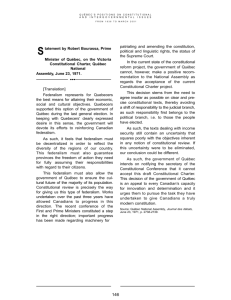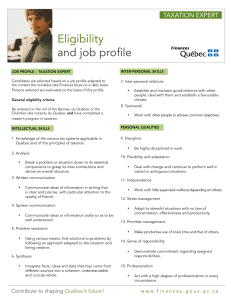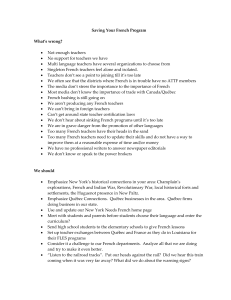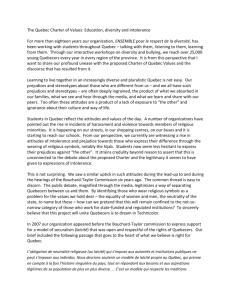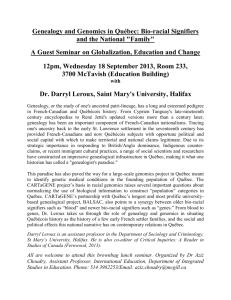2010-2011 Budget: Choices for the Future
advertisement
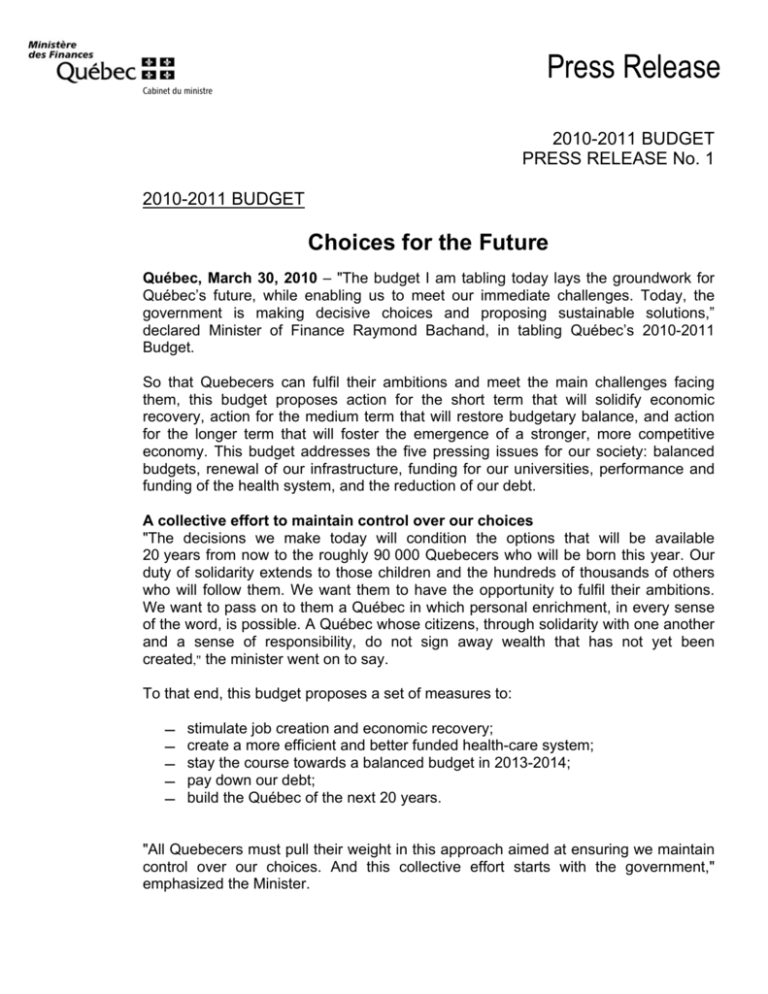
Press Release Cabinet du ministre 2010-2011 BUDGET PRESS RELEASE No. 1 2010-2011 BUDGET Choices for the Future Québec, March 30, 2010 – "The budget I am tabling today lays the groundwork for Québec’s future, while enabling us to meet our immediate challenges. Today, the government is making decisive choices and proposing sustainable solutions,” declared Minister of Finance Raymond Bachand, in tabling Québec’s 2010-2011 Budget. So that Quebecers can fulfil their ambitions and meet the main challenges facing them, this budget proposes action for the short term that will solidify economic recovery, action for the medium term that will restore budgetary balance, and action for the longer term that will foster the emergence of a stronger, more competitive economy. This budget addresses the five pressing issues for our society: balanced budgets, renewal of our infrastructure, funding for our universities, performance and funding of the health system, and the reduction of our debt. A collective effort to maintain control over our choices "The decisions we make today will condition the options that will be available 20 years from now to the roughly 90 000 Quebecers who will be born this year. Our duty of solidarity extends to those children and the hundreds of thousands of others who will follow them. We want them to have the opportunity to fulfil their ambitions. We want to pass on to them a Québec in which personal enrichment, in every sense of the word, is possible. A Québec whose citizens, through solidarity with one another and a sense of responsibility, do not sign away wealth that has not yet been created," the minister went on to say. To that end, this budget proposes a set of measures to: stimulate job creation and economic recovery; create a more efficient and better funded health-care system; stay the course towards a balanced budget in 2013-2014; pay down our debt; build the Québec of the next 20 years. "All Quebecers must pull their weight in this approach aimed at ensuring we maintain control over our choices. And this collective effort starts with the government," emphasized the Minister. Press release 1 Page 2 A stronger culture of spending control The vast consultation carried out in fall 2009 and winter 2010 enabled tens of thousands of Quebecers from all walks of life and all regions to share their concerns and suggestions with us. In the wake of that process, the government is unveiling today its economic and budgetary action plan. Thus, the government is announcing a major and demanding effort to control and reduce spending growth. The planned measures include the following: a two-year pay freeze for the premier, ministers and MNAs; a civil service payroll freeze until 2013-2014; suspension of incentive bonuses for the next two years for senior officers of the public and para-public sectors. A comparable effort will be required of senior officers of government corporations; a gradual 10% decrease in administrative operating expenses by 2013-2014; a 25% reduction in advertising, training and travel costs; maintenance of the rule replacing only one out of every two employees who retire, and extension of this measure to administrative staff in the health and education networks, including directors; reiteration of the pay proposal submitted to the unions with a view to renewing the collective agreements, and application of the proposal to the public sector as a whole; termination of automatic renewal of programs upon expiry; self-financing of new initiatives; review and examination of government programs; amalgamation or abolishment of some 30 organizations. A downward revision of spending growth As a result of these measures in particular, program spending growth will be reduced to 3.2% this year and 2.8% as of 2011-2012, until budgetary balance is restored. Furthermore, through an additional rationalization effort by government corporations and the intensification of the fight against tax evasion and tax avoidance, the government will assume more than 60% of the financial effort required to put our public finances back in order. Taking into account the introduction of a dedicated health funding contribution, program spending growth will in fact be 2.9% in 2010-2011 and 2.2% in 2011-2012. It will remain at 2.2% until 2013-2014, that is, until budgetary balance is restored. Subsequently, program spending growth will be tied to economic growth. Press release 1 Page 3 The need to increase revenues Despite the substantial effort by the government, revenues must be increased in order to put the public finances in order. To that end, the budget provides for fair measures that will be applied gradually. These include: an increase in the QST by another percentage point on January 1, 2012 in order to balance the books and improve funding of our services; implementation of the policy for the funding of public services; an increase in the fuel tax to ensure the sustainability of the road and public transit infrastructure fund; charging of a royalty on water used as an input or in production processes; an increase in the compensatory tax on financial institutions; revision of the mining duties regime. To limit the impact of some of these measures and protect the purchasing power of the less affluent, the budget provides for the creation of a new refundable tax credit— the solidarity tax credit. Assuming our responsibilities toward future generations The 2010-2011 Budget also provides for extensive measures that provide lasting solutions to various challenges linked, in particular, to the health system, funding for our universities and debt repayment: creation of a dedicated health fund to be financed by a general contribution that will be payable by all Québec adults, with the exception of low-income households; continued implementation of a green economy by making sustainable development an important thrust of our economy; sustainable funding for the road and public transit infrastructure fund through an increase in the fuel tax; a gradual increase, as of 2014, in the price of heritage pool electricity supplied by Hydro-Québec. These additional revenues will be paid into the Generations Fund to reduce the debt; adjustment of the debt reduction targets so as not to increase the burden of debt on future generations; an increase in university tuition fees as of fall 2012 to ensure adequate funding for our universities, and the calling of a meeting of education partners to flesh out the details of the increase and discuss the performance and funding of the university network. A budget in the image of Quebecers "The immediate objective of this budget is to protect our economic and social gains, but its ultimate goal is to better enable Quebecers to fulfil their ambitions for themselves, their loved ones and their community. This budget will foster the emergence of a prosperous, creative and green Québec. A Québec present on all the world markets thanks to entrepreneurs and international centres for excellence, Page 4 Press release 1 thanks to natural resources and thanks, most of all, to Quebecers themselves," the Minister said. He concluded: "This budget is in the image of Quebecers: ambitious and realistic. It proposes strategies for ensuring the prosperity and well-being of Quebecers in the short term by solidifying economic recovery, in the medium term by eliminating the deficit, and in the longer term by fostering the emergence of a stronger, more competitive economy. Quebecers are ambitious. I know they have the courage to pursue their ambitions. " - 30 Source: Catherine Poulin Press Officer Office of the Minister of Finance and Minister responsible for the Montréal region 418 643-5270 514 873-5363 www.finances.gouv.qc.ca
